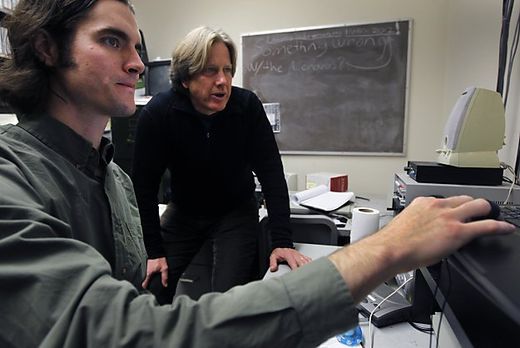
That's now scientifically proven by studies, say UC Berkeley scientists who do those studies.
These wise men and women have come up with quantifiable, tested data showing that with little more than an attitude boost, anyone can get through the toughest of holiday times with not just smiles on their faces, but real warmth in their hearts.
That goes for all those encounters with father-in-laws who could never stand your face, nephews who smash your favorite platter just to hear it shatter and sisters who think you're a loser. Or even cousins fresh out of prison for the New Year.
It's all about concentrating on the things in our lives that work well and being thankful for them, then tossing in a heaping helping of compassion, say the goodness-minded folks at the Greater Good Science Center.
Carrying on nice family rituals, religious or not, that are comforting and foster pleasant togetherness also goes a long way, they say.
Grind out the Grinch
The center has a set of reports, self-administered online tests - the "Altruism Quiz" is one - and graphics with good-attitude hints to reinforce all this advice. Paying close attention can help grind the Grinch right out of anyone, the center's researchers say.
"The gist of it isn't any more complicated than the fact that consumption and materialism will not make us happy," said Christine Carter, a sociologist whose title at the center is the Santa-worthy one of "Happiness Expert."
"We confuse those things with happiness," Carter said. "But we have found that there are three main things that make you happier over the holidays, and they have nothing to do with materialism."
Those three things consist of feeling grateful for the good things in your life, taking time with your family and using every opportunity you can to help others.
"The need for feeling grateful starts with Thanksgiving, but it doesn't have to end," Carter said. "It's important all year round to be grateful for the things that a lot of people take for granted. It can be your kids, your close friends, even just the fact that you have hot water for a shower.
"When you train your attention on what you feel grateful for, you are highly likely to miss the hassles," Carter said. "Our brains act as giant filters. We are either going to notice what we appreciate, or things that tick us off."
Helping helps
As for helping others, Carter said, studies of emotional stimulation prove that the old saying about it being "better to give than to receive" is not just folklore.
"When you help someone else, whether it's at a soup kitchen or just among your friends, it just makes you happier," she said. "For one, when we're focused on other people, we can't focus on ourselves as much. You can't be brooding on that nasty e-mail you got from the stepmother who doesn't want you to cook turkey, or whatever.
"A lot of us just need to be distracted from ourselves sometimes," Carter said.
Dacher Keltner, founder of the center and a UC Berkeley psychology professor, said his research on the vagus nerve in the brain is reinforcing the importance of compassion.
The vagus nerve extends from the brain down to the abdomen, and it reflects and stimulates feelings of happiness. Dacher's research with doctoral candidate Craig Anderson indicates that showing compassion, maintaining eye contact and taking time to relax with techniques such as taking a deep breath all result in a healthily stimulated vagus - which in turn makes you happier.
"We know that December is one of the most violent months on the calendar, and there is stress this time of year with travel and getting together with family," Keltner said. "But there is rock-solid science that shows that, instead of moving toward stress, you can move toward appreciating other people and feeling calmer at this time of year."
Connect to others
He said his center has found that people are less connected to their neighbors and have fewer friends than 20 years ago, and that counteracting that trend is useful for Christmas, Hanukkah or New Year bliss.
"If you volunteer, look more closely to people who support you, allow yourself to touch people you care about with hugs or even just a neck massage - it all helps," Keltner said. "Also, watch how you breathe - taking deep breaths when you need to, really do help calm you down."
Carter is well aware that the reaction to feel-good advice can at times be more a rolling of the eyes rather than a nod of the head. That's understandable, she said.
Letting yourself enjoy the holidays, let alone your entire life, can take a bit of concentration and work, she said. But it's worth it.
"I think of happiness as a skill," said Carter, whose seemingly perpetual incandescent smile would indicate that she takes her own advice. "It's all about what you practice and think about."



Comment: When facing the holiday stress, just take a few minutes to practice the very simple but extremely effective breathing and meditation techniques of the Éiriú Eolas program. In fact, since you will feel the results immediately, you might decide to practice it throughout the year's stressful moments, so that with your vagus nerve active, you can feel in your life the happiness the researches above are talking about.